Luke 24
Luke 24 is the twenty-fourth and final chapter of the Gospel of Luke in the New Testament of the Christian Bible. The book containing this chapter is anonymous, but early Christian tradition uniformly affirmed that Luke the Evangelist composed this Gospel as well as the Acts of the Apostles.[1] This chapter records the discovery of the resurrection of Jesus Christ, his appearances to his disciples and his ascension into heaven.[2]
| Luke 24 | |
|---|---|
John 1 → | |
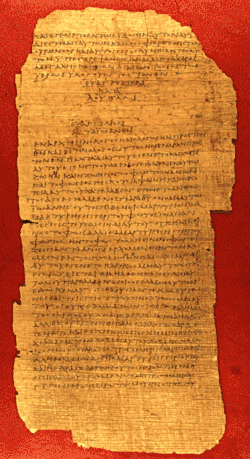 Luke 24:51-53, continued with John 1:1-16, on Papyrus 75, written about AD 175-225. | |
| Book | Gospel of Luke |
| Category | Gospel |
| Christian Bible part | New Testament |
| Order in the Christian part | 3 |
| Gospel of Luke |
|---|
Text
The original text was written in Koine Greek. This chapter is divided into 53 verses.
Textual witnesses
Some early manuscripts containing the text of this chapter are:
- Papyrus 75 (AD 175-225)
- Codex Vaticanus (325-350)
- Codex Sinaiticus (330-360)
- Codex Bezae (~400)
- Codex Washingtonianus (~400)
- Codex Alexandrinus (400-440)
- Codex Ephraemi Rescriptus (~450; extant verses 1-6, 46-53)
Resurrection morning (24:1–12)
.jpg.webp)
.jpg.webp)
Verse 1
It was the day of Preparation, and the sabbath was beginning. The women who had come with him from Galilee followed, and they saw the tomb and how his body was laid. Then they returned, and prepared spices and ointments... But on the first day of the week, at early dawn, they came to the tomb, taking the spices that they had prepared. They found the stone rolled away from the tomb
F. W. Farrar, in the Cambridge Bible for Schools and Colleges, suggests that the words "certain other women" are "probably spurious", not being part of the text in the Codex Sinaiticus, Codex Vaticanus, Codex Ephraemi Rescriptus or Codex Regius manuscripts.[3]
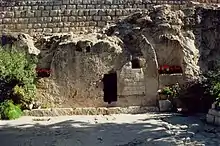
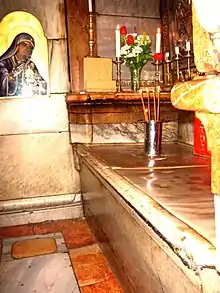
Verse 10
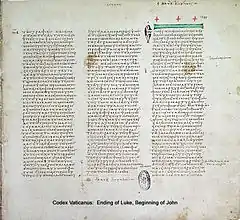
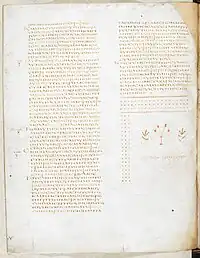
"The women who had come with him from Galilee" included "Mary Magdalene, Joanna, Mary the mother of James, and the other women with them".
It was Mary Magdalene, Joanna, Mary the mother of James, and the other women with them, who told these things to the apostles.
The names of some women are mentioned in the canonical gospels, but only Luke's gospel mentions Joanna, implying that Luke receives his special information from "one (most likely Joanna) or more than one of" the women.[4] In Luke 8:1–3 Mary called Magdalene, Joanna the wife of Chuza, and Susanna are named as women who provided material sustenance to Jesus during his travels, along with other unnamed women.
While Matthew, Mark and John mentioned the names of the women present at the cross, Luke only refers them as "the women that followed him from Galilee" (Luke 23:49), but name the women at the end in the story of the women's visit to the empty tomb (Luke 24:10).[4] The two passages with the names of some women alongside the mention of the "twelve" and "apostles", respectively (Luke 8:1–3 and Luke 24:10), "form a literary inclusio" which brackets the major part of Jesus' ministry (leaving out only the earliest part of it).[4][lower-alpha 1]
Verse 12
- But Peter arose and ran to the tomb; and stooping down, he saw the linen cloths lying by themselves; and he departed, marveling to himself at what had happened.[5]
This verse and verse 34, "The Lord is risen indeed, and has appeared to Simon!", suggest that Peter (alone) went to the tomb, whereas verse 24, And certain of those who were with us went to the tomb and found it just as the women had said, implies more than one person.[6]
American biblical scholar Kim Dreisbach states that Greek: οθονια (othonia), translated here as "linen cloths", is "a word of uncertain meaning ... probably best translated as a generic plural for grave clothes". The same word is used in John 19:40.[7]
Road to Emmaus (24:13–35)
Luke 24:13–35 describes Jesus' appearance to two disciples who are walking from Jerusalem to Emmaus, which is said to be 60 stadia (10.4 to 12 km, depending on the definition of stadion is used) from Jerusalem. One of the disciples is named Cleopas (verse 18), while his companion remains unnamed.
Road to Emmaus (24:36–49)
Verse 36
- Now as they said these things, Jesus Himself stood in the midst of them, and said to them, "Peace to you."[8]
- "Peace to you" (KJV: "Peace be unto you"): rendering the Greek phrase εἰρήνη ὑμῖν, eirēnē hymin,[9] which is a literal translation of the customary Jewish salutation שָׁלוֹם לָכֶם, shalom lekom (cf. Matthew 10:12; Luke 10:5).[6][10]
This account agrees with John 20:19, which notes the fact that 'the doors of the room had been closed for fear of the Jews'.[6][10]
Verse 37
- They were fearful and terrified and thought they were seeing a ghost.[11]
Ascension of Jesus (24:50–53)
Verse 51
- Now it came to pass, while He blessed them, that He was parted from them and carried up into heaven.[12]
The words "and carried up into heaven" are not included in some ancient texts of the gospel.[13]
Verse 53
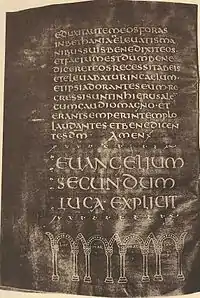
- and were continually in the temple praising and blessing God. Amen. [14]
Luke's gospel ends where it began,[15] in the temple.[16]
The King James Version ends with the word "Amen", following the Textus Receptus, but modern critical editions of the New Testament exclude this word, as do many modern English translations.[17] In a manuscript copy of Beza's, there are added words:
- The Gospel according to Saint Luke was published fifteen years after the ascension of Christ,[18]
a tradition also known to the eleventh-century Byzantine bishop Theophylact of Ohrid.[19]
See also
Notes
- Luke has another bigger inclusio using Simon Peter as "both the first and the last disciple to be named in his Gospel" (Luke 4:38; Luke 24:34), similar to Mark.[4]
References
- Holman Illustrated Bible Handbook. Holman Bible Publishers, Nashville, Tennessee. 2012.
- Halley, Henry H. Halley's Bible Handbook: an Abbreviated Bible Commentary. 23rd edition. Zondervan Publishing House. 1962.
- Farrar, F. W., Cambridge Bible for Schools and Colleges on Luke 24, accessed 27 July 2018
- Bauckham 2017, p. 131.
- Luke 24:12 NKJV
- Meyer, Heinrich August Wilhelm (1880). Commentary on the New Testament. Luke 24. Translation by Peter Christie from Meyer's sixth edition. Accessed February 14, 2019.
- The Definitive Shroud of Turin FAQ, accessed 27 July 2018
- Luke 24:36 NKJV
- Luke 24:36 Greek text analysis. Biblehub.
- Ellicott, C. J. (Ed.) (1905). Ellicott's Bible Commentary for English Readers. Luke 24. London : Cassell and Company, Limited, [1905-1906] Online version: (OCoLC) 929526708. Accessed 28 April 2019.
- Luke 24:37 NCVTemplate:Bibleverse with invalid book NCV
- Luke 24:51 NKJV
- Footnote g in the New Revised Standard Version at Luke 24:51
- Luke 24:53 KJV
- Luke 1:9
- Jerusalem Bible (1966), footnote at Luke 24:53
- BibleGateway.com, Translations of Luke 24:53
- Gill, J., Gill's Exposition of the Entire Bible on Luke 24, accessed 28 July 2018
- Theophylact of Ohrid, Preface to the Gospel of Matthew Archived 2018-07-28 at the Wayback Machine, accessed 28 July 2018
Bibliography
- Bauckham, Richard (2017). Jesus and the Eyewitnesses (2nd ed.). Wm. B. Eerdmans Publishing. ISBN 9780802874313.
External links
- Luke 24 King James Bible - Wikisource
- English Translation with Parallel Latin Vulgate Archived 2019-06-17 at the Wayback Machine
- Online Bible at GospelHall.org (ESV, KJV, Darby, American Standard Version, Bible in Basic English)
- Multiple bible versions at Bible Gateway (NKJV, NIV, NRSV etc.)
| Preceded by Luke 23 |
Chapters of the Bible Gospel of Luke |
Succeeded by John 1 |